When hiring a team of sweeps to work on your chimney and fireplace, there are a few important questions you should be asking yourself. For instance, do they receive a lot of positive reviews? Are they insured? How long have they been in business? All of these say a lot about a company, but there is one more question you definitely don’t want to miss: Are they certified?
In the chimney industry, earning certifications is a vital part of bringing customers the best care possible, and it ensures the sweeps don’t miss a thing when it comes to the safety and efficiency of your appliance. Both the CSIA and the NFI play a big part in educating sweeps across the country and, here at Lords Chimney, we’re proud to be associated with both of them.
The CSIA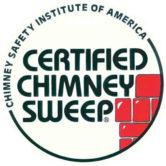
What Is The CSIA
The CSIA, or Chimney Safety Institute of America, is a nonprofit organization that has been setting the standard for chimney and fireplace education since its start back in 1983. The leaders of the CSIA strive to keep sweeps up-to-date and knowledgeable on everything they need to know about your chimney’s anatomy, and they also strive to keep homeowners educated on the safest ways to operate their fireplace.
Now, becoming certified with the CSIA is no easy feat, which is one reason why hiring a team that has put in the time and effort to do so is always a better bet. It takes hours of studying, training, and test-taking to earn this honor, so you can rest easier knowing the sweeps that have it truly know their stuff.
The Process To Be Certified
What’s the process like exactly? Well, technicians will first purchase multiple training materials that must be studied thoroughly. Next, they need to do one of the following: attend a training school, go to a review session in person, or take an online review of these materials. Each option requires a lot of time and dedication! Finally, there is the exam that consists of two parts: a one-hour, 100-question portion and an hour and a half open-book portion.
As you can see, the whole process takes a considerable amount of time, and CSIA certified sweeps are required to renew their certifications every three years, as well. This is done by either taking an exam again or by obtaining a high number of continuing education units. This ensures they are always on top of any new developments, as well as updates on techniques, tools, or technology.
Finally, the CSIA offers the option to become a Certified Dryer Exhaust Technician, which ensure the techs you hire know everything they need to know about thoroughly cleaning out your dryer vents. This reduces the risk of dryer fires significantly, and it keeps your appliance functioning as efficiently as possible.
The NFI
The NFI is another organization that certifies sweeps. NFI stands for National Fireplace Institute, and it specializes in equipping sweeps to install hearth appliances and venting systems correctly. When it comes to installation services, even small mishaps or mistakes can lead to bringing problems for the homeowners, so getting these techniques down precisely is essential.
Like the CSIA, the NFI is a nonprofit, and it has been offering its services to industry professionals since 1981. NFI professionals must take an in-depth examination before earning their credential, and they must renew it every 3 years by taking a new exam. If there are any new products introduced into the field or any new and improved approaches when it comes to installation strategies, you can bet an NFI certified expert will know about it!
Certified Chimney Professionals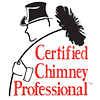
A Certified Chimney Professional certification is another certification sweeps can earn to improve their fireplace knowledge. This achievement is earned by purchasing their specific manual, then taking an examination over the materials. Once you successfully pass the test, you get your certificate.
Passing this exam takes experience, training, and a lot of expert knowledge. If the sweeps you hire have done so, it is clear that they are dedicated individuals who will continuously strive to go above and beyond for their customer base.
The Lords Chimney Crew Is Certified With Them All
If you’ve worked with us before, then you may know our technicians, Lee, Llynn, and Billy. They are all certified with the CSIA, and they have received a number of accomplishments with the other organizations listed above, as well. Well, now we’re proud to add two new certified sweeps, Ivan and Ryan, to our team. When you work with us, you can stress less because we’ve got a great team of qualified technicians on the job!
We’re Also Members Of The NCSG

Member of the NCSG
The National Chimney Sweep Guild (NCSG) doesn’t offer certifications but, by being associated with them, you are given the opportunity to attend conferences, stay up-to-date on industry news, and stay connected with others in the same line of business. This institute is all about promoting success and safety, ensuring homeowners everywhere receive the best care possible. We’re proud to be a part of this distinguished group!
Call Today To Make An Appointment
Whether you’re overdue for an inspection, need creosote swept out, are struggling with crumbling brickwork, or something else, we are confident our crew can help you out. We handle leak repairs, relining work, nest removal, troubleshooting, installation work, and a whole lot more. Don’t hesitate to reach out now for the care and attention you deserve.
Whether it’s a musty or moldy smell, a soft drip-drip sound coming from the chimney, or a puddle of water at the bottom of the firebox, a leaky chimney is a problem that cannot be ignored. Left unrepaired, even minor chimney leaks can create major damage throughout your fireplace system.
Thankfully, leaky chimneys don’t have to be a chronic problem. Identifying the source of the water entry and fixing your leaky chimney as soon as possible can prevent serious water damage to your fireplace system or home.
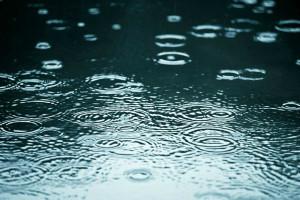
What causes chimney leaks?
Chimneys are built to stand strong against the elements; however, there are still a number of points where water can work its way into the chimney system. The following are some of the most common causes of chimney leaks.
Chimney cap: The chimney cap protects the top of the chimney and keeps moisture, animals, and debris from falling into the chimney. A damaged chimney cap can allow water into the flue, causing damage throughout the fireplace and chimney structure.
Chimney crown: Often confused with the chimney cap, the chimney crown is a mortar slab that seals the top of the chimney. Chimney crowns should have small overhangs as well as be built with slightly sloped edges to prevent water from pooling on the top. Chimney crowns can deteriorate over time due to prolonged exposure to the elements; this creates cracks that allow moisture into the chimney.
Flashing: Flashing is the watertight metal strips that seals the joint between the chimney and the roof. Over time, flashing can lose its seal due to overexposure to the elements; flashing can also be damaged by storms or animals.
Masonry damage: Without regular maintenance, bricks and mortar can begin to deteriorate over time. The freeze thaw process – which causes water in bricks to freeze and expand – is the most common cause of water damage to masonry.
Fixing a leaky chimney
When it comes to fixing a leaky chimney, the most important step is to find and repair the cause of the chimney leak. Repairing the water damage without first removing the cause of the chimney leak will only lead to recurrent water problems. By uncovering the root cause of the chimney leak, you can rest assured that the water damage will not return once the necessary repairs have been made.
For chimneys with damaged masonry, tuckpointing may be used to repair or replace damaged bricks and mortar. During the tuckpointing process, small areas of damaged masonry are carefully removed before the new bricks and mortar are put in; this can help strengthen the chimney structure and help avoid the costs of rebuilding the entire chimney.
Another great way to prevent chimney leaks and water damage is by having your chimney waterproofed. Professionally waterproofing a chimney can seal and protect the masonry from water damage while still allowing the bricks to retain their semi-porous nature.
If you have a leaky chimney, trust the experts at Lords Chimney to repair it. Contact us today to schedule an appointment so we can help resolve your chimney leaks!
When it comes to fireplace and chimney service, installation, and maintenance, finding the right company to work with can be hard to do. With so many businesses to choose from, it can be difficult to determine the seasoned professionals from the seasonal workers.
Although anyone with a brush and a truck might be able to call themselves a chimney sweep, few have earned the Chimney Safety Institute of America, or CSIA, certification. By hiring a certified chimney sweep, you can feel confident that you are working with a highly trained and educated professional.
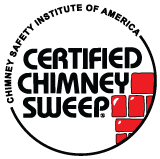
Are all chimney sweeps certified?
Many homeowners mistakenly believe that all chimney sweeps are created equally. Unfortunately, there are few regulations or restrictions on the industry. Because of this, any handyman with a couple of brushes can call themselves a chimney sweep. Oftentimes, these “chimney sweeps” do little more than push around the ash and soot in your chimney, making more of a mess than actually cleaning the chimney.
In order to get the best service possible for your fireplace and chimney system, it is important to work with a CSIA certified chimney sweep. The CSIA certification is recognized as the gold standard in the industry. Chimney sweeps that hold a CSIA certification have completed extensive education, training, and testing and represent the best in the industry in terms of skill and professionalism.
In order to earn their CSIA certification, chimney sweeps must study and be tested on topics such as:
- Fireplace and chimney safety practices
- Local and national building and fire codes
- Fireplace and chimney building dynamics for wide range of units
- Installation and maintenance practices for fireplaces, inserts, and stoves
- Current EPA standards for fireplaces, inserts, and stoves
CSIA certified chimney sweeps must also stay up to date on current industry practices. Because they must retest every three years in order to maintain their certification, CSIA-certified sweeps have information on the most recent safety and technology developments and best practices in the industry.
Hiring a certified chimney sweep
Because chimney maintenance can directly impact the safety of you and your family, it is important to work with a professional that you trust. Before hiring a chimney sweep, consider asking them the following questions:
- How long has your chimney sweeping company been in business?
- Can you offer current references?
- Do you have unresolved complaints filed with any consumer protection agencies or the Better Business Bureau?
- Does the company or the individual chimney sweep carry business liability insurance policy to protect my home and furnishings against accidents?
- Will the company guarantee that a CSIA Certified Chimney Sweep will be on my job site?
Don’t trust your family’s safety to the cheapest company you can find. Instead, hire a CSIA certified chimney sweep to ensure that your chimney’s maintenance and repairs are done correctly – the first time. In the Houston area, contact Lords Chimney to schedule an appointment with our CSIA certified chimney sweeps!
Gas fireplaces continue to grow in popularity due to their energy savings, ease of use, and low maintenance. Gas logs are particularly popular due to their ability to recreate the look and feel of a wood burning fire at the push of a button. While there is significantly less work with a gas fireplace compared to a wood burning one, gas fireplaces still need regular cleaning and upkeep.
Although gas logs do not have ashes or soot to remove after each use, they should be regularly cleaned to maintain efficiency and safety. Cleaning a gas log is an easy process, but special care should be taken to ensure that no fireplace parts or pieces are damaged.
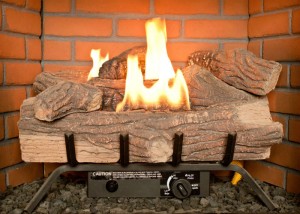
Cleaning your gas log
The interior and exterior portions of your gas log fireplace should be cleaned at least twice a year to prevent an excessive buildup of soot or dust. However, only cleaners that are specially designed for gas fireplaces should be used. Other chemical or homemade cleaning agents may have abrasive qualities on the gas, metal, or ceramic parts of the fireplace. In addition, the chemicals in non-fireplace cleaners may react when the fireplace is relit for use. A specialized cleaner can be purchased at many fireplace retailers.
The exterior glass and metal can be wiped down as often as needed using a clean, damp cloth or other specialized cleaner. The burners, control compartments, and ceramic logs can be gently cleaned with a dry cloth or soft bristled paintbrush. A vacuum may also be used, but can should be taken not to shift or move the gas log or its components.
Safety considerations
Before attempting to clean your gas logs, make sure that the gas valve has been completely shut off. Likewise, none of the fireplace components should be warm to the touch from recent use, as the heat may react negatively with the cleaners.
Referencing the manufacturer’s manual is another way to ensure that you are safely and correctly cleaning your fireplace logs and other components. The manual should give detailed instructions on how to safely clean the fireplace with minimal risks.
If you believe you have damaged any of the components of your gas log fireplace during cleaning, contact a professional before using the fireplace again. Even shifting a gas log a few inches can impact both performance and safety.
Do I need a chimney sweep?
Many homeowners are surprised to find that they still need their chimney swept after installing a gas log. Gas appliances still produce small amounts of creosote, which can coat the inside of the flue. In addition, high efficiency modern gas fireplaces are also at risk for incomplete combustion and water condensation.
An improperly sized chimney or flue cannot create sufficient drafting for a gas fireplace, leading to incomplete combustion. When this occurs, gasses such as carbon monoxide may linger in the fireplace. Likewise, accumulating water condensation can be corrosive to the flue lining.
Having a regular chimney cleaning and inspection can help protect your family against any emerging chimney or fireplace issues, as well as ensure that your gas fireplace is still running safely and efficiently. If you have questions about how to clean your gas fireplace or need to schedule a chimney inspection, contact Lord’s Chimney today!







